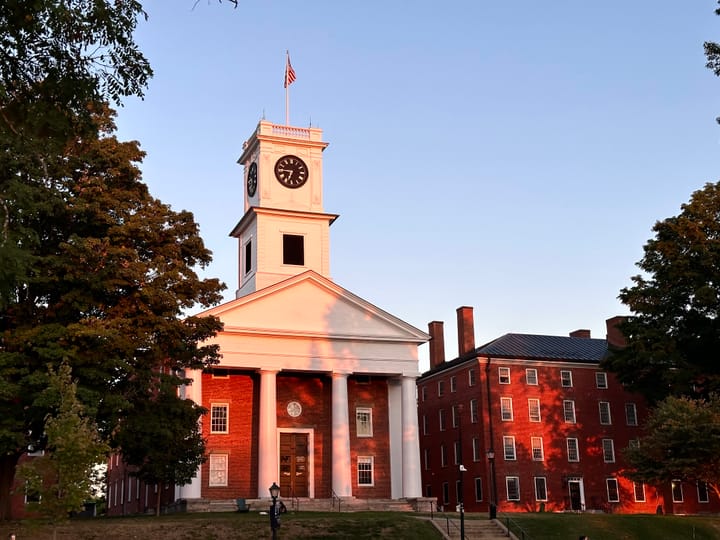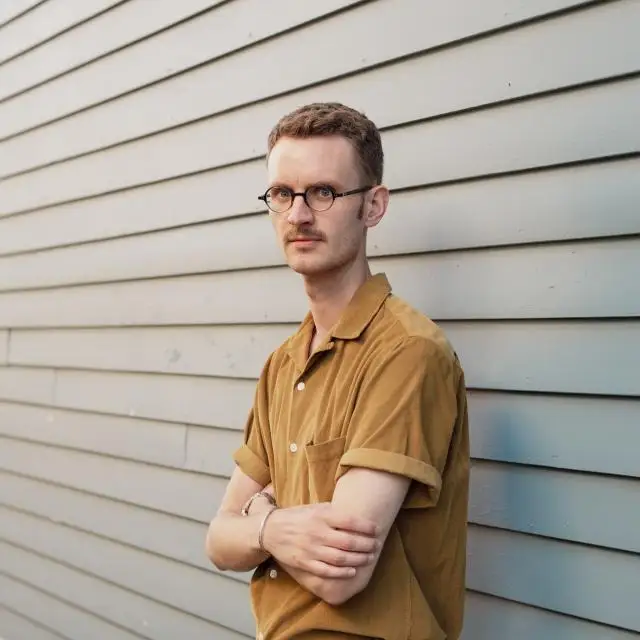Smile! You're on 'The College Show'
“It’s basically like ‘America’s Funniest Home Videos’ for college students,” said Koppel. “We have all sorts of weird assignments that we ask college students to participate in. They’re little video assignments that students can send in and they can get seen by millions of students.”
Koppel created the show with Harold Ramis, a director whose films include “Analyze This,” “Bedazzled,” “Ghostbusters,” “Caddyshack” and “Groundhog Day.” Aside from being a fun project, Koppel is excited that his show could be the first step for many inexperienced college students into the elusive world of show business.
“The really exciting thing is that Harold is a major director. For people that are interested in the entertainment, people that want to have something on their resume when they leave college, what would be better than to have something of yours on TV?” said Koppel. “Having left college and having looked for jobs before, [I know] it is an incredibly great thing to have had something that people have seen before. And even better is to work on something like this with friends.”
“The College Show,” which is projected to premiere next fall as a half-hour show, will feature weekly special guests and, of course, the winning college tapes of the week. “The guest comes in and everyone just talks about college and they watch the videos together and basically just make fun of them,” said Koppel. “Harold actually wanted to make a show about college before and we wanted college students to film it, but I knew that it was going to be difficult. You can’t just tell students to write a paper about anything; you get nothing back. Instead, the idea of making things very specific became the way to do it.”
Fifteen minutes of shame
A list of assignments, available at “The College Show” website on comedycentral.com includes topics such as: bother people in the library quietly, document the weird and wild traditions that take place at your school, find your campus’ nuttiest professor and document his weirdness, profiles of best and worst bands, find someone doing ‘the walk of shame’ back to the dorms and lifestyles of the rich and famous. “I went to school with Blossom Beatty, related to Ned Beatty, [Otis from] Superman, who was the most famous person that I knew, and it was really exciting for us,” said Koppel.
But Koppel’s favorite assignment is to get deep with a stoner. “You are the grasshopper; he is the guide,” he said. “Document his lifestyle while he explains his philosophy of human existence. I knew a very great number of people that could have done that for me at Amherst. I could’ve done that. I could’ve been the stoner. It would’ve been me.”
Koppel hopes that Amherst students will take advantage of the countless video-worthy people and places at the College. “I’m hoping that we’re going to get some great material from Amherst students,” he said. “Almost everyone has access to a digital camera and these are really funny assignments to do [and] there’s no right answer.”
Where would Koppel take his camera on the fairest campus? For one assignment, documenting the craziest professor on campus, Koppel had no trouble thinking of people whose day in the spotlight has been long overdue. “I would take my camera to [Professor of Spanish] Jim Maraniss-he was my advisor,” he said. “He’s a nutty professor. So was [Professor of Russian] Stanley Rabinowitz. [Professor of English] Andy Parker is another total nutball.”
And Koppel’s ideas don’t stop there. “Find the hottest professors,” he said. “There are some hot professors at Amherst. They know who I’m talking about.”
The fairest campus
In addition to the aesthetic beauty of the faculty, Koppel, an English and fine arts double major, also appreciated the natural beauty of the College and the quality of the people on campus. “I remember that it was a really pretty place,” he said. “What I really loved at Amherst was the ability to pursue the type of work that you’re interested in pursuing-no core curriculum, no math or science for me. And I loved the student body, always people that were interested in making stuff and working.”
Although Koppel loved the academic world at Amherst, he found his true passion in extracurricular activities. “I was the one that revived Mr. Gad’s [House of Improv],” he said. “At the time, they were just doing improv games. I taught them how to do ‘the Harold,’ which is a long, 30 minute, freeform piece of comedy.”
It was Koppel’s love of the Second City comedy troupe as a boy in Chicago that drew him to Harold Ramis later in life. “Harold is one of the Second City alumni with Jon Belushi,” he said. “I grew up going to Second City. I worked with Del Close, who invented improv and died recently.”
As director of Mr. Gad’s, Koppel instituted the weekly Monday night performances in the Campus Center Frontroom. “I wanted something that people could look forward to on Monday nights,” he said. “The weekend is over and you need something to look forward to.”
Color outside the lines
Koppel, with the help of his classmates, was responsible for several ground-shaking events that changed Amherst and even the rest of the nation. “I wasn’t really destroying the institution,” he said. “I was more enhancing it.”
“If you go back into the archives of The Student, I did all sorts of crazy things and a lot of them were reported [on],” he said. “I ran a fake candidate for the student government-oh man, I did terrible things.”
One of these exploits got Koppel into a considerable amount of trouble with the deans. Several students harrassed a homosexual student-a friend of Koppel’s-leading to an apology of questionable sincerity by one of the perpetrators.
“The apology was like, ‘I regret that I shouted the word ‘faggot’ and homophobia is a terrible thing.’ It was retarded,” said Koppel. “So I took this guy’s facebook picture and I plastered it all over the campus and underneath it I quoted parts of his letter, because I thought it was so farcical.”
Fortunately, Koppel was not expelled. “I got in real trouble because they thought I was assassinating his character, which essentially I was,” he said. “But it was good; sometimes you’ve got to shake things up. In the end, they decided that I worked within the bounds of the campus and you’re allowed to protest things.”
Not all of Koppel’s activities, however, were as dramatic as this close brush with authority. As a junior, Koppel started Citizen Poke, one of the first online magazines for college students. “I made this comedy magazine online and this was before the web was really viable,” Koppel said. “We were in Newsweek and Cyberscope. It started monthly, then we began to publish nationwide and then we made it weekly.”
To fund his new venture, Koppel sold ads in his magazine and did whatever he could to raise the money he needed. “It was not a campus publication; I didn’t want it to be,” he said. “My feeling is that if you get the funding from the campus, it could be cut off at anytime. I also owned The Option, which helped.”
Because the Internet had not advanced graphically as much as Koppel would have liked, he resorted to Acrobat as his medium. “I worked with Mike Barrett [’96] and Seth Mirick [’97],” said Koppel. “When it was weekly, I was a senior and we had writers from all over the country who were submitting stuff.”
His senior thesis, a series of 700-page flip books, also launched him into the media industry. “I always wanted to be involved in media and get things in to the world,” said Koppel. “For my thesis, I made six books and then I continued to revise them and revise them and I found a publisher, Harper Collins, that was interested in publishing them.”
His thesis was finally published as a single volume called “Good Grief,” and sold in Urban Outfitters and Barnes and Noble. “It was a counter book,” Koppel said. “It was funny, but it was also highly emotional. It’s a biography of my life and stories from my childhood.”
Koppel took all the images for the books with the webcam on his desktop while at Amherst. “[Former Professor of Fine Arts] Wendy Snauffer really helped me with that book; she taught me how to take pictures,” he said. “She basically wrote the book on 19th century photography and it was really an amazing asset to have her there.”
When “Good Grief” was published, a friend of Ramis’ introduced it to him and it was then that Koppel began his correspondence with the director. Koppel had already worked for Sony, Rage Against the Machine and Oxygen Media, a cable channel for women, and was ready to bring his experiences into the new show with Ramis.
“I always wanted to make a TV show and I’m very excited that I get the chance,” he said. “It gets back to Mr. Gad’s-I loved to make a show every week. Something about doing it every week, that it’s deliberate, that there’s a lot of work involved and it continues. I liked the taste of it.”
Currently, “The College Show” exists only as a pilot, but knowledge of its existence has been spreading rapidly on campuses across the country. In one day, the website had received as many as 6000 hits. “I’d love for college students to pass it along to each other,” said Koppel. “I’d like students to send in tapes and spread the word to their friends. It’s important to me that it gets to the right people, the creative people in college.”
Koppel encourages any student interested in filmmaking especially to seriously consider this opportunity. “Always think about the product; think about something that you can take with you,” he said. “Just the ability to have a tape or a website that you can basically give to people to remember you by is a great asset to have.
If you’re interested in participating in Koppel’s pilot, check out “The College Show” at comedycentral.com. The deadline for submissions is April 19.





Comments ()